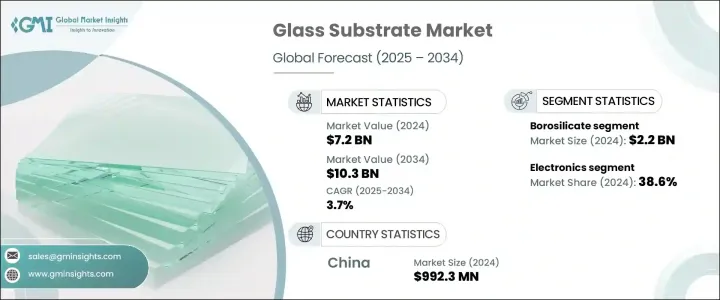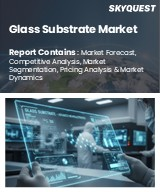
|
시장보고서
상품코드
1716680
유리 기판 시장 기회, 성장 촉진요인, 산업 동향 분석 및 예측(2025-2034년)Glass Substrate Market Opportunity, Growth Drivers, Industry Trend Analysis, and Forecast 2025 - 2034 |
||||||
세계의 유리 기판 시장 규모는 2024년에 72억 달러로 평가되었고, 2025년부터 2034년에 걸쳐 3.7%의 연평균 복합 성장률(CAGR)을 나타내 안정적으로 확대될 것으로 예측되고 있습니다.
플랫패널·디스플레이, 솔라패널, 광학기기 등의 첨단기술에 대한 수요가 높아져 시장을 견인하고 있습니다. 기술의 혁신과 함께 고성능 전자 기기에 대한 기호가 높아지고 있는 것이 여러 산업에서 유리 기판의 채용을 뒷받침하고 있습니다.

유리 기판은 반도체나 디스플레이 용도에 뛰어난 치수 안정성과 표면 평활성을 제공합니다. 게다가 자동차 업계에서는 첨단 디스플레이나 센서 기술의 이용이 증가하고 있어 시장의 견조한 전망에 기여하고 있습니다.
| 시장 규모 | |
|---|---|
| 시작 연도 | 2024년 |
| 예측 연도 | 2025-2034년 |
| 시작 금액 | 72억 달러 |
| 예측 금액 | 103억 달러 |
| CAGR | 3.7% |
유리 기판 수요는 특히 스마트 디바이스 및 전자 디스플레이의 급속한 제조로 인해 활발한 소비자 전자 분야와 밀접하게 관련되어 있습니다. 계속해서 유리 기판은 디스플레이의 성능과 내결함성을 높이기 위한 중요한 솔루션을 제공합니다.
유리 기판 시장은 붕규산, 실리콘, 용융 실리카/석영, 알루미노실리케이트, 세라믹 등의 재료 유형별로 구분됩니다. 이 중 붕규산 유리는 2024년 22억 달러 규모를 차지했으며 2025년부터 2034년까지 연평균 4%의 성장률을 나타낼 것으로 예상됩니다. 붕규산염 기판은 뛰어난 화학적 안정성, 뛰어난 내열성, 높은 내구성에 의해 널리 선호되고 있어, 일렉트로닉스, 의약품, 솔러 용도에 최적입니다.
일렉트로닉스 분야는 혁신적인 소비자 일렉트로닉스의 왕성한 수요에 견인되어 2024년에는 시장 점유율의 38.6%를 획득했습니다. 의자 및 기타 첨단 전자 제품에 중요한 재료 인 유리 기판은 고성능, 내구성 및 광학적으로 선명한 솔루션을 찾는 제조업체에게 필수적인 존재로 남아 있습니다.
중국의 유리 기판 시장은 2024년에 9억 9,230만 달러에 달했고, 최첨단 기술과 인프라에의 다액의 투자에 지지되고 있습니다. 평판 디스플레이 제조 및 반도체 분야의 급속한 발전으로 중국은 유리 기판 분야의 글로벌 리더로서 입지를 강화하고 있으며, 차세대 애플리케이션에 사용되는 고성능 소재에 대한 수요가 크게 증가하고 있습니다.
목차
제1장 조사 방법과 조사 범위
제2장 주요 요약
제3장 업계 인사이트
- 생태계 분석
- 밸류체인에 영향을 주는 요인
- 이익률 분석
- 파괴적 혁신
- 향후 전망
- 제조업체
- 유통업체
- 공급자의 상황
- 이익률 분석
- 주요 뉴스와 대처
- 규제 상황
- 영향요인
- 성장 촉진요인
- 일렉트로닉스 산업에서의 수요 증가
- 디스플레이 기술의 진보
- 웨어러블 일렉트로닉스의 채용 확대
- 태양광 발전 산업의 확대
- 아시아태평양 수요 증가
- 업계의 잠재적 위험 및 과제
- 제조상의 문제
- 엄격한 환경 규제
- 성장 촉진요인
- 성장 가능성 분석
- Porter's Five Forces 분석
- PESTEL 분석
제4장 경쟁 구도
- 서론
- 기업 점유율 분석
- 경쟁 포지셔닝 매트릭스
- 전략 전망 매트릭스
제5장 시장 추계·예측 : 유형별(2021-2034년)
- 주요 동향
- 붕규산염
- 실리콘
- 용융 실리카/석영
- 알루미노실리케이트
- 세라믹
제6장 시장 추계·예측 : 최종 이용 산업별(2021-2034년)
- 주요 동향
- 일렉트로닉스
- 자동차
- 헬스케어
- 항공우주 및 방위
- 에너지
- 기타
제7장 시장 추계·예측 : 지역별(2021-2034년)
- 주요 동향
- 북미
- 미국
- 캐나다
- 유럽
- 독일
- 영국
- 프랑스
- 이탈리아
- 스페인
- 네덜란드
- 아시아태평양
- 중국
- 인도
- 일본
- 한국
- 호주
- 라틴아메리카
- 브라질
- 멕시코
- 아르헨티나
- 중동 및 아프리카
- 아랍에미리트(UAE)
- 사우디아라비아
- 남아프리카
제8장 기업 프로파일
- Absolics
- AGC
- Applied Materials
- Corning
- Guardian Industries
- HOYA Corporation
- Kyodo International
- Nippon Electric Glass
- NOVA Electronic Materials
- Ohara
- Saint-Gobain
- Samsung Display
- SCHOTT
- Shin-Etsu Chemical
- TOPPAN
The Global Glass Substrate Market was valued at USD 7.2 billion in 2024 and is projected to expand at a steady CAGR of 3.7% between 2025 and 2034. The rising demand for advanced technologies, including flat-panel displays, solar panels, and optical devices, is driving the market forward. As a critical component in consumer electronics and renewable energy sectors, glass substrates offer unparalleled durability, transparency, and heat resistance. The growing preference for high-performance electronic devices, alongside innovations in display technologies such as OLED and LCD, is pushing the adoption of glass substrates across multiple industries. Increasing investments in renewable energy, particularly solar, are also fueling demand, as glass substrates serve as a core material in photovoltaic panels.

The market is further influenced by the accelerating shift toward miniaturized and lightweight electronic components, where glass substrates provide excellent dimensional stability and surface smoothness for semiconductor and display applications. Additionally, the automotive industry's increasing use of advanced displays and sensor technologies is contributing to the market's robust outlook. With emerging trends in smart homes, wearable devices, and next-generation medical equipment, the role of glass substrates continues to grow, reflecting the market's dynamic evolution.
| Market Scope | |
|---|---|
| Start Year | 2024 |
| Forecast Year | 2025-2034 |
| Start Value | $7.2 Billion |
| Forecast Value | $10.3 Billion |
| CAGR | 3.7% |
The demand for glass substrates is tightly linked to the booming consumer electronics sector, especially with the rapid manufacturing of smart devices and electronic displays. As manufacturers continue to focus on delivering thinner, larger, and more efficient displays for smartphones, televisions, and automotive infotainment systems, glass substrates offer a vital solution for enhancing display performance and resilience. Their superior optical clarity, high thermal resistance, and mechanical strength allow for seamless integration into cutting-edge electronics, making them indispensable in the production of modern smart gadgets and advanced display panels.
The glass substrate market is segmented by material type, including borosilicate, silicon, fused silica/quartz, aluminosilicate, and ceramic. Among these, borosilicate glass accounted for USD 2.2 billion in 2024 and is anticipated to grow at a CAGR of 4% from 2025 to 2034. Borosilicate substrates are widely preferred due to their excellent chemical stability, superior heat resistance, and high durability, making them ideal for electronics, pharmaceuticals, and solar applications. With increasing demand for OLED and LCD displays, borosilicate glass has emerged as a staple material, driving notable growth in the segment.
The electronics segment captured a 38.6% share of the market in 2024, driven by strong demand for innovative consumer electronics. As a critical material for flat-panel displays, smart devices, and other advanced electronics, glass substrates remain essential for manufacturers seeking high-performance, durable, and optically clear solutions.
China glass substrate market reached USD 992.3 million in 2024, backed by substantial investments in cutting-edge technologies and infrastructure. With rapid advancements in flat-panel display manufacturing and semiconductors, China is strengthening its position as a global leader in glass substrates, significantly boosting demand for high-performance materials used in next-gen applications.
Table of Contents
Chapter 1 Methodology & Scope
- 1.1 Market scope & definition
- 1.2 Base estimates & calculations
- 1.3 Forecast calculation
- 1.4 Data sources
- 1.4.1 Primary
- 1.4.2 Secondary
- 1.4.2.1 Paid sources
- 1.4.2.2 Public sources
Chapter 2 Executive Summary
- 2.1 Industry synopsis, 2021-2034
Chapter 3 Industry Insights
- 3.1 Industry ecosystem analysis
- 3.1.1 Factor affecting the value chain
- 3.1.2 Profit margin analysis
- 3.1.3 Disruptions
- 3.1.4 Future outlook
- 3.1.5 Manufacturers
- 3.1.6 Distributors
- 3.2 Supplier landscape
- 3.3 Profit margin analysis
- 3.4 Key news & initiatives
- 3.5 Regulatory landscape
- 3.6 Impact forces
- 3.6.1 Growth drivers
- 3.6.1.1 Rising demand from the electronics industry
- 3.6.1.2 Advancements in display technology
- 3.6.1.3 Growing adoption of wearable electronics
- 3.6.1.4 Expansion of the photovoltaic industry
- 3.6.1.5 Growing demand in Asia Pacific
- 3.6.2 Industry pitfalls & challenges
- 3.6.2.1 Issues with manufacturing
- 3.6.2.2 Stringent environmental regulations
- 3.6.1 Growth drivers
- 3.7 Growth potential analysis
- 3.8 Porter's analysis
- 3.9 PESTEL analysis
Chapter 4 Competitive Landscape, 2024
- 4.1 Introduction
- 4.2 Company market share analysis
- 4.3 Competitive positioning matrix
- 4.4 Strategic outlook matrix
Chapter 5 Market Estimates and Forecast, By Type, 2021 – 2034 (USD Billion) (Kilo Tons)
- 5.1 Key trends
- 5.2 Borosilicate
- 5.3 Silicon
- 5.4 Fused silica/quartz
- 5.5 Aluminosilicate
- 5.6 Ceramic
Chapter 6 Market Estimates and Forecast, By End Use Industry, 2021 – 2034 (USD Billion) (Kilo Tons)
- 6.1 Key trends
- 6.2 Electronics
- 6.3 Automotive
- 6.4 Healthcare
- 6.5 Aerospace & defense
- 6.6 Energy
- 6.7 Others
Chapter 7 Market Estimates and Forecast, By Region, 2021 – 2034 (USD Billion) (Kilo Tons)
- 7.1 Key trends
- 7.2 North America
- 7.2.1 U.S.
- 7.2.2 Canada
- 7.3 Europe
- 7.3.1 Germany
- 7.3.2 UK
- 7.3.3 France
- 7.3.4 Italy
- 7.3.5 Spain
- 7.3.6 Netherlands
- 7.4 Asia Pacific
- 7.4.1 China
- 7.4.2 India
- 7.4.3 Japan
- 7.4.4 South Korea
- 7.4.5 Australia
- 7.5 Latin America
- 7.5.1 Brazil
- 7.5.2 Mexico
- 7.5.3 Argentina
- 7.6 Middle East and Africa
- 7.6.1 UAE
- 7.6.2 Saudi Arabia
- 7.6.3 South Africa
Chapter 8 Company Profiles
- 8.1 Absolics
- 8.2 AGC
- 8.3 Applied Materials
- 8.4 Corning
- 8.5 Guardian Industries
- 8.6 HOYA Corporation
- 8.7 Kyodo International
- 8.8 Nippon Electric Glass
- 8.9 NOVA Electronic Materials
- 8.10 Ohara
- 8.11 Saint-Gobain
- 8.12 Samsung Display
- 8.13 SCHOTT
- 8.14 Shin-Etsu Chemical
- 8.15 TOPPAN



















